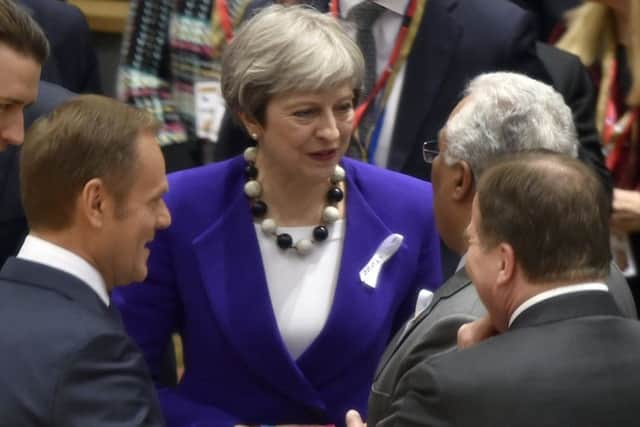Border deal must be done by October: Varadkar
and live on Freeview channel 276
However, DUP MP Sammy Wilson said that Mr Varadkar’s “border fixation” is blinding him to the “deep trouble” facing the Irish economy.
“If a free trade deal is not done between the UK and EU by October, then the Irish economy would be cut off from its main international market – the UK,” he said.
Advertisement
Hide AdAdvertisement
Hide AdUnionists have opposed any solution which would create differences between Northern Ireland and the rest of the UK and Prime Minister Theresa May is reliant on DUP support in key Westminster votes.


Ahead of a meeting with European counterparts in Brussels Mr Varadkar said: “Everyone takes the view that we will have to have the withdrawal treaty agreed by October because it will have to be ratified by the British parliament and the European parliament, and potentially by some national parliaments. So October is the deadline.”
He added: “Would I like to have it [the withdrawal deal] done by June? Yes, absolutely. But I would rather have the right deal in October rather than any deal in June.”
He envisaged a really close UK-EU trading relationship, “so close that many of measures in the backstop may become unnecessary”.
Advertisement
Hide AdAdvertisement
Hide AdThe backstop clause in the withdrawal treaty foresees NI continuing under the same single market and customs union rules as the rest of the EU.


The British government is facing increased pressure to find a solution to the border, one of the most vexed issues of the Brexit negotiations on which there has been little detailed agreement with the EU.
Avoiding a hard border is generally defined as one without frontier checks on goods and services, but there has been no evidence of a technological solution for frictionless trade anywhere else in the world, a committee of MPs said.
European Parliament President Antonio Tajani said yesterday: “The onus is now on the British government to propose such a solution.
Advertisement
Hide AdAdvertisement
Hide Ad“But I want to make it clear once again that the European Parliament will not give its consent to a withdrawal agreement that does not incorporate solutions to rule out hard borders between the two parts of the island and which can be implemented immediately.”
Mr Varadkar reiterated his stance on the importance of the backstop arrangement if no other solution is found.
But he said that was not his preferred option and envisaged a “deep” free trade agreement between the UK and EU.
He added: “A customs union partnership between the UK and EU that would be so close to the customs union that it would not necessitate some of the elements that are in the backstop.”
Advertisement
Hide AdAdvertisement
Hide AdBut Mr Wilson said the Republic was already operating a 99% frictionless border with non-EU trade partners – and that it would be discriminatory not to offer the UK the same deal.
“According to the World Trade Organisation,” he said, “the Republic of Ireland is second only to Gambia in being the country that carries out the fewest physical checks on international trade, with only 1% of goods from non-EU states physically checked.
“The vast majority of Irish trade with countries such as China and the US is facilitated by means such as prior notification and trusted trader status.
“If this rate is applied to current cross-border trade, according to Irish customs figures it would mean stopping only 63 vehicles a day.”
Advertisement
Hide AdAdvertisement
Hide AdHe added: “Mr Varadkar’s border fixation at the expense of the Irish economy must either be motivated by his desire to beat Sinn Fein at the next election or his desire to curry favour with the EU on Irish financial contributions.”
While there is intense pressure on the UK to come up with proposals for a frictionless border, he said, European law actually puts the onus on EU members states – in this case the Republic of Ireland – to guard the EU frontier with the UK.
“Therefore Tory backbenchers are increasingly saying that the UK should put up no barriers at all on the Irish border and that the EU and Republic of Ireland can ‘do what they want’ in response.”